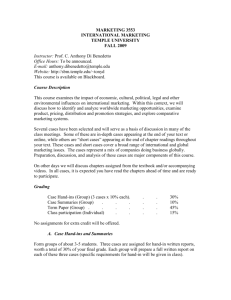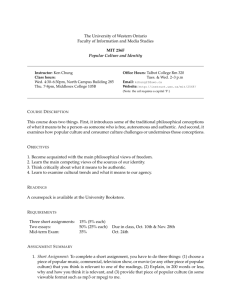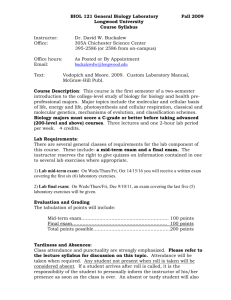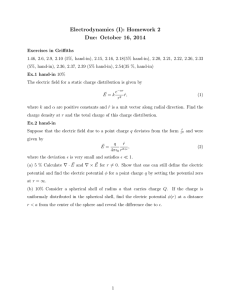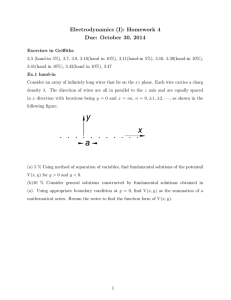8SIF111
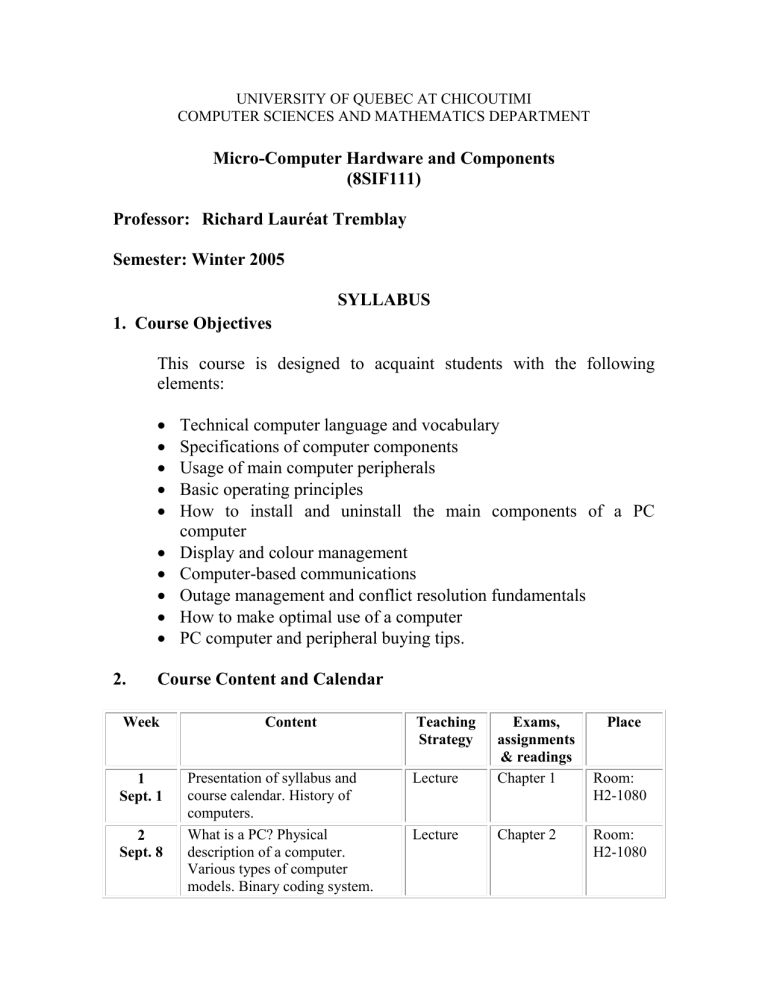
UNIVERSITY OF QUEBEC AT CHICOUTIMI
COMPUTER SCIENCES AND MATHEMATICS DEPARTMENT
Micro-Computer Hardware and Components
(8SIF111)
Professor: Richard Lauréat Tremblay
Semester: Winter 2005
SYLLABUS
1. Course Objectives
This course is designed to acquaint students with the following elements:
Technical computer language and vocabulary
Specifications of computer components
Usage of main computer peripherals
Basic operating principles
How to install and uninstall the main components of a PC computer
Display and colour management
Computer-based communications
Outage management and conflict resolution fundamentals
How to make optimal use of a computer
PC computer and peripheral buying tips.
2. Course Content and Calendar
Week
1
Sept. 1
Content
Presentation of syllabus and course calendar. History of computers.
Teaching
Strategy
Lecture
Exams, assignments
& readings
Chapter 1
Place
Room:
H2-1080
2
Sept. 8
What is a PC? Physical description of a computer.
Various types of computer models. Binary coding system.
Lecture Chapter 2 Room:
H2-1080
3
Sept. 15
4
Sept.
22
5
Sept.
29
6
Oct. 6
7
Oct. 13
8
Oct. 17
History of processors. Types of processors and their characteristics. A computer’s speed. Motherboard and buses.
Aspects and installation of new cards. Peripheral pilots.
Configuration module assistant.
Ram & Rom: role and types.
Hard disk structure. Electrical input.
Disk subsystems (IDE/ATA,
SCSI). File systems (FAT16,
FAT32, NTES). Tape support.
Data saving and retrieval.
Monitors – operating & adjusting, types & specifications. Graphics boards. Audio-video material.
Mid-term exam on theory taught in class
Lecture
Lecture
Lecture
Lecture
Lecture
Oct.
25-29
9
Nov. 3
10
Nov.10
11
Nov. 17
12
Nov. 24
13
Dec. 1
Mid-term break
Removable internal storage units
(CD-Rom, DVD, ZIP, etc.).
Usual peripherals. Optimization and performance tests.
How to build your own PC – PC buying tips. Disk cleaning and maintenance. Security (antivirus, firewall).
Role of system utilities. Conflict detection and resolution.
Architecture incompatibility.
Presentation of general cases.
Problem solving. Main standards.
Communication on a PC.
Modems – use, unit of measurement, types and specifications. Trash can: properties and retrieving deleted files.
Lecture
Lecture
Lecture
Lecture
Lecture
Chapter 3
Exercise 1
Chapter 4
Hand-in
Exercise 1
Chapter 5
Exercise 2
Chapter 6
Hand-in
Exercise 2
Chapter 7
Room:
H2-1080
Room:
H2-1080
Room:
H2-1080
Room:
H2-1080
No documents permitted.
Chapter 8
Exercise 3
Room:
H2-1080
Room:
H2-1080
Room:
H2-1080
Chapter 9
Hand-in
Exercise 3
Room:
H2-1080
Chapter 10 Room:
H2-1080
Chapter 11
Exercise 4
Chapter 13
Hand-in
Exercise 4
Room:
H2-1080
Room:
H2-1080
14
Dec. 8
Final exam on theory taught in class.
No documents permitted
Exam covers subject matter seen since week 8
Laboratory Hand-in final project
Room:
H2-1080
15
Dec. 15
How to assemble & disassemble a computer.
Room:
To be confirmed
3. Evaluation
Exams (55%)
Mid-term exam: (30%)
Final exam: (25%)
Final Project (25%)
Assignments (20%) * 4 Exercises
Exercise 1 (5%)
Exercise 2 (5%)
Exercise 3 (5%)
Exercise 4 (5%)
Assignments must be handed-in by e-mail only . An address will be provided for each assignment. Assignments must not be sent via any other means (FTP, diskettes, etc.).
*Work turned in late will incur a 10% penalty per day.
*Students are held responsible for any technical aspects with the exception of those under the responsibility of the university. It is up to the students to take alternative measures if necessary. Students will sometimes need 3.5” diskettes for this course.
A+: 97 + A: 93-96 A-: 89-92
B+: 85-88
C+: 73-76
D+: 61-64
B: 81-84
C: 69-72
D: 57-60
B-: 77-80
C-: 65-68
F: 0-56
In compliance with the institution’s evaluation policy, the professor will pay particular attention to the quality of the written English used, and reserves the right to take up to 5 points off the final mark.
Copyright ©2001-2004 Richard L. Tremblay. All rights reserved.

